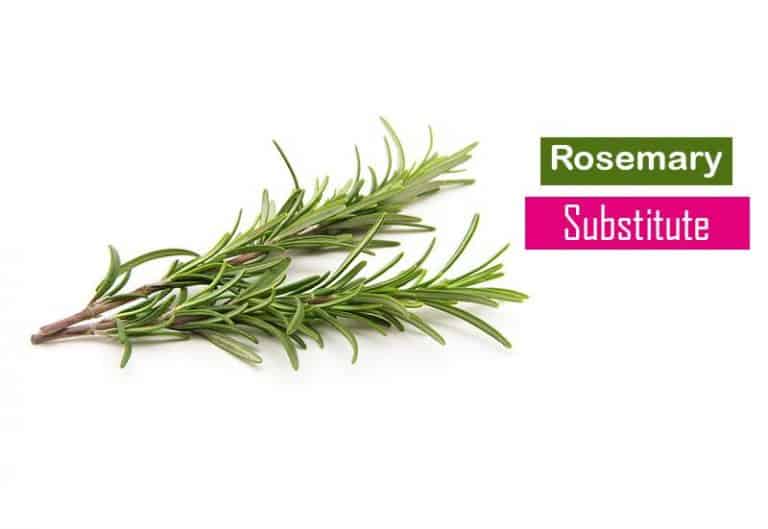
Juniper berries are one of the most popular fruits, and they resemble blueberries in appearance. Juniper berries and blueberries, on the other hand, are very different. Because of their many functions, juniper berries are frequently utilized in cuisine. It’s utilized for meat dishes like game and even sauerkraut in most European and Scandinavian cuisines.
If you don’t have juniper berries but want to make a traditional European cuisine, try rosemary, caraway seeds, gin, cardamom, bay leaf, and hickory spices, etc.Let’s examine how these European cuisines can be made with juniper berries substitutes.
Essential Facts About Juniper Berries
What Are Juniper Berries?
The juniper tree belongs to the cypress family. Rather than pine needles, this evergreen tree has flat, scaly, hairy leaves that are highly sharp needles. They’re mostly employed as ground cover and don’t go much bigger than a shrub or small bush.
The seed cones of juniper trees look a lot like blueberries when they’re mature. They are not berry plants, despite their juniper name.
The most widely consumed juniper fruit is Juniperus communis, or common juniper, which we shall learn more about in the following material.
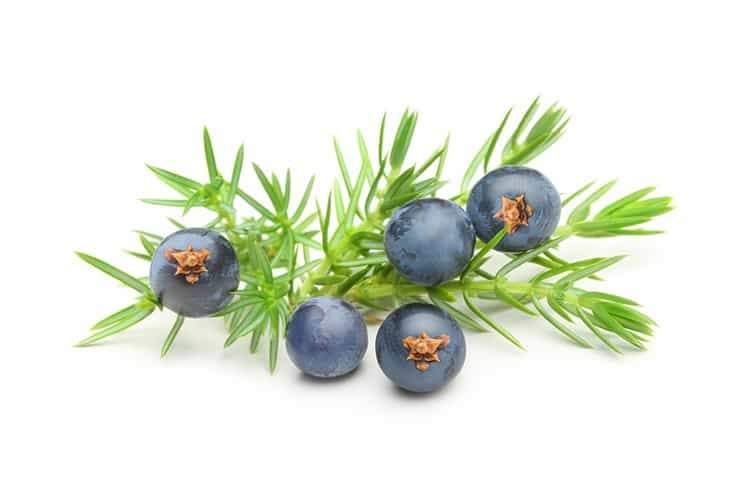
What Does a Juniper Berry Taste Like?
You must first learn to taste to correctly replace juniper berries. The first notes sound like pine trees, and they could be pine berries.
You don’t have to cook often to understand the value of aroma in food; it can improve our taste and give us a more comfortable sensation when we eat it, comparable to when we taste something delicious. The benefits of mint are numerous.
Juniper berries are used to flavor alcoholic beverages, brine, and heavy meat dishes for the same reason.
You might remember the aroma of juniper berries if you’ve ever enjoyed a gin drink. Floral and citrus aromas mingle with woody pine notes
What Are Juniper Berries Often Used For?
The most common application of juniper berries in gin is as a flavoring ingredient. You can use it to flavor a range of different beverages, as well as cooking and baking preparations if you don’t wish to use it as a flavoring agent for spirits.
Juniper berries are also utilized to make essential oils, which are then used as medicine or flavoring. If you don’t have any juniper berries on hand, don’t panic; there are plenty of fantastic substitutes.
Common Juniper Berries Substitutes
1. Caraway Seeds
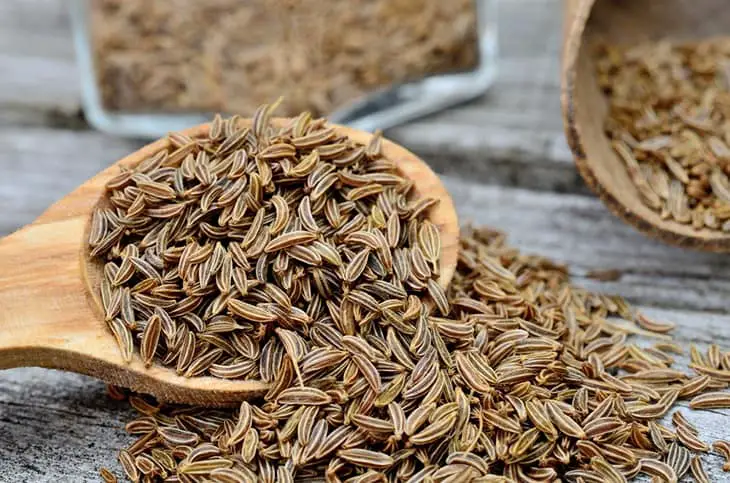
What could be better than having some caraway seeds in your garden; wouldn’t it be wonderful? Caraway seeds, also known as meridian fennel or Persian fennel, have a mild flavor but a distinct aroma. Herb and spice stores are frequently stocked with these seeds. If that isn’t an option, you can shop online, as most countries allow international shipping.
It is one of the most effective juniper berry substitutes since it has a taste that is comparable to licorice. It can bring a dish that is so appealing that no one can resist eating it.
How To Substitute:
When substituting this nut, use a 1:1 ratio. One teaspoon of caraway seeds, for example, can be used in place of one teaspoon of juniper berries.
You can also add a bay leaf or two if you wish to boost the aroma. You can modify the seasoning to your preference in a unique way because you are the chef.
2. Cardamom
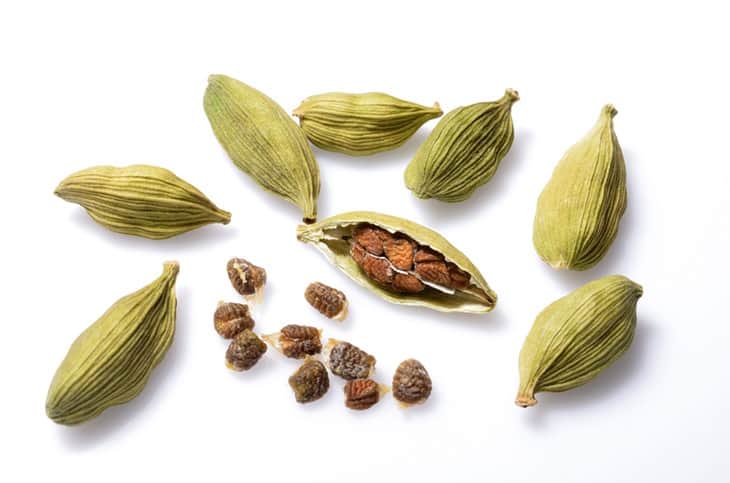
Meanwhile, cardamom is a prominent spice in Indian cuisine and other delectable European pastries, and it is frequently employed by housewives. However, you will be astonished at how well it works in the kitchen. Only if you consider juniper berries to be prohibited may you use this spice as a substitute for their distinct flavor and aroma.
Before being eaten, the cardamom seeds are dried after being collected. It is most commonly used to improve the scent and flavor of savory foods. In addition, its entire peel and seeds are widely used in different cuisines.
This sort of nut should be purchased pre-ground for ease of use. The disadvantage of this nut is that it is fairly costly when compared to the nuts discussed previously. However, because its qualities are most closely related to juniper berries, its high price is understandable.
How To Substitute:
It’s just as simple to use as the prior nuts for this spice. Maintain a 1:1 ratio. 1 teaspoon cardamom can be replaced with 1 teaspoon juniper berries. Depending on the size of your dish, you can raise or decrease the amount.
To avoid wasting this spice, adjust the ingredients and taste them before adding more.
3. Hickory Spice
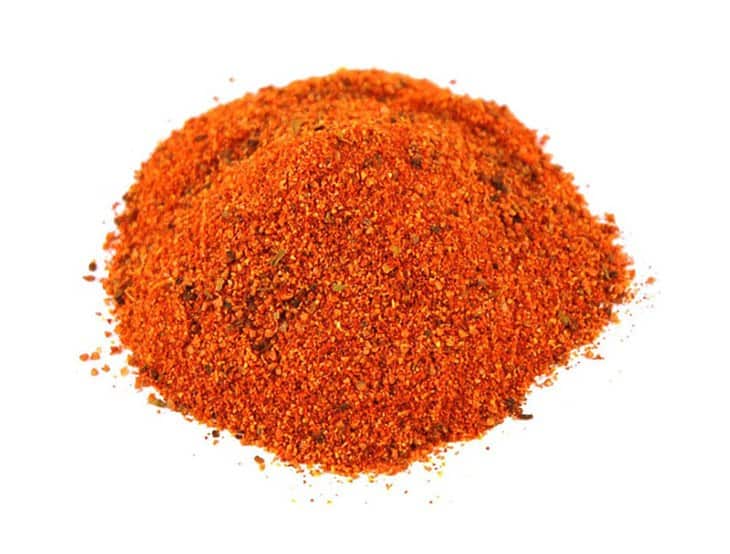
The next condiment is hickory, which can be found in a number of brands at most supermarkets. Cumin, garlic, onion, peppers, salt, and, of course, hickory powder are all included in hickory flavoring. As a result, this spice is both aromatic and savory, making it an excellent substitution for juniper berries in recipes.
How To Substitute:
With a slightly different ratio of this spice than the ones indicated above. One teaspoon of juniper berries can be replaced with 1.5 tablespoons of hickory spice.
If you want, you can enhance the amount of spice in this dish. Because this seasoning isn’t especially spicy, using more than a 1:1 ratio shouldn’t be an issue. If you enjoy it, you can experiment with the taste to see where it leads.
4. Rosemary

The next spice we’ll show you is rosemary, which is really versatile. To get a long-lasting supply of herbs from your kitchen, dry them beforehand or buy the whole plant from the market. It’s perfect for pan-fried foods like steak. A few sprigs might help to improve the flavor and aroma of meat. Aside from its culinary significance, it is well-known for generating perfumes, essential oils, and fragrances for cleaning liquid soaps.
How To Substitute:
All you have to do now is sprinkle a few rosemary sprigs into the meal while it’s cooking. Use at least 2-3 rosemary sprigs to replace one teaspoon of juniper berries.
If you’ve recently gathered some fresh bushmeat or other red meat, the lack of juniper berries is likely affecting the quality of your dish. As a result, this spice is an excellent alternative for its scent and flavor.
You can either marinate the rosemary leaves first or cook them in the pan with the meat. This seasoning should be cooked alongside the meat in the pan because it enhances the flavor and aroma of the meat even more.
5. Gin

Yes, gin may be used as a juniper berries substitute. I’m sure some of us have tried gin at some point. If you don’t have juniper berries, instead of going to the store, go down to the cellar and use gin. A gin that doesn’t have a label or a set alcohol content. You can make this alternative using anything you have on hand.
How To Substitute:
Replace one tablespoon of juniper berries with one tablespoon of gin for this spice. You can alter or increase the quantity to suit your preferences. If you want to make it more fragrant, you can also add herbs or spices.
6. Bay Leaves
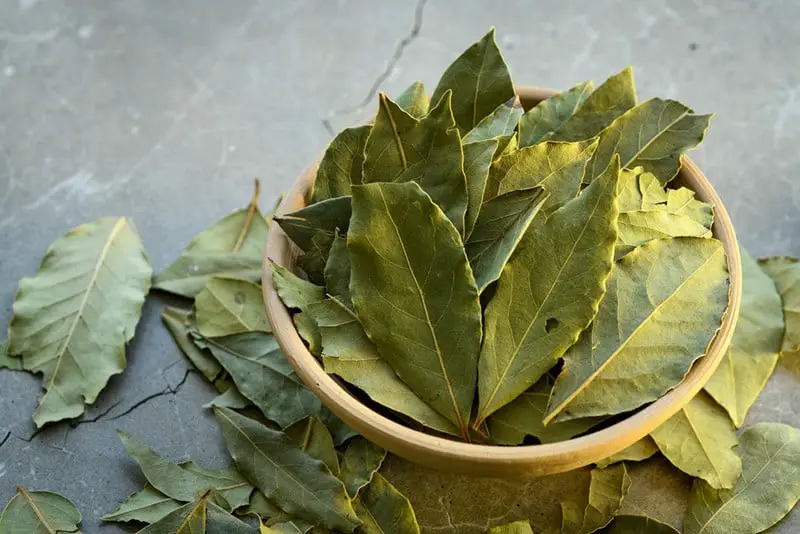
Bay leaf is another pungent spice that is well-known all throughout the world. We all know how aromatic bay leaves are, and even a single leaf can do wonders. There are two types of dried leaves: powder and whole grain. Because pine needles are not edible, they are typically added just to enhance the flavor of the food during processing and then discarded afterward.
How To Substitute:
Use the 1:1 ratio if you have ground bay leaves on hand. Don’t worry if you go over the ratio because bay leaves aren’t particularly strong when used in excess.
Juniper Berries Substitutes In Juice Recipes
Although juniper berry juice is difficult to come by, reishi juice or pleasantly hot cranberry cider can simply be substituted.
While none of these beverages is a perfect substitution for juniper berry flavors, they are both excellent pairings for meals that are frequently served with juniper juice.
Juniper Juice isn’t readily accessible anymore. In Scandinavia, though, this fruit is commonly used throughout the Christmas season. Both the berries and the needles are used to make juniper drinks.
People don’t buy it as much as they used to because it isn’t as popular in stores these days.
1. Lingonberry Juice
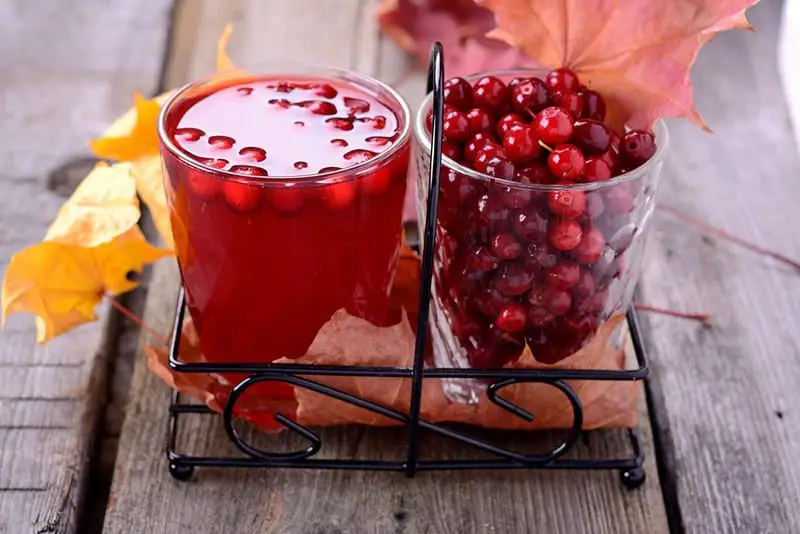
If you enjoy venison and game meat, Lingonberry Juice is an excellent choice for a pleasant drink. In the summer, cool lemonade is favoured, whereas, in the winter, heated cranberry juice is preferred.
Lingonberry juice is supposed to help with a variety of ailments, including urinary tract infections.
It’s a good substitute for juniper juice, however, it’s not quite the same. The flavor of reishi juice is powerful but acidic, whereas the flavor of juniper juice is more musty and sweet
Recipe for Lingonberry Juice: During the holidays, Scandinavians, in particular, like a juniper berry juice. You can make a terrific alternative to a festive drink by mixing strawberry juice with Christmas flavors like apple and cinnamon.
Instructions:
- Wash or defrost berries
- In a pot, mash the lingonberry with the sugar and add the water.
- Cook for 15 minutes while stirring constantly.
- Strain with care.
2. Cranberry-Apple Cider

Cranberry cider can also be used instead of juniper juice. For the holidays, this is a popular cocktail. What else is there to do on a frigid winter day? There’s nothing like a drink of hot cranberry cider to warm you up.
Making your cranberry-apple cider is simple. It has a fantastic tangy and sweet flavor. Here is a simple dish that you should try.
Instructions:
- In a saucepan, combine all of the ingredients.
- Bring to a boil.
- Reduce the heat to low and cook for 15 minutes, uncovered.
- Carefully strain
- Fill mugs with the mixture and serve!
Juniper Berries Substitutes In Tea Recipes
You can substitute pine wood tea, reishi tea, or cranberry tea for juniper berry tea, all of which are highly healthful. They also have a lot of nutrients that are good for you.
One thing you must agree is that juniper berry tea is difficult to come by in regular stores. Juniper berry tea is regarded as a medicinal as well as a hot beverage. As a result, health food stores sell tea.
The most evident benefit of Juniper Tea for patients with kidney problems is that it can help the kidneys operate more effectively. It may also aid in the prevention of urinary tract infections.
1. Pinewood Tea
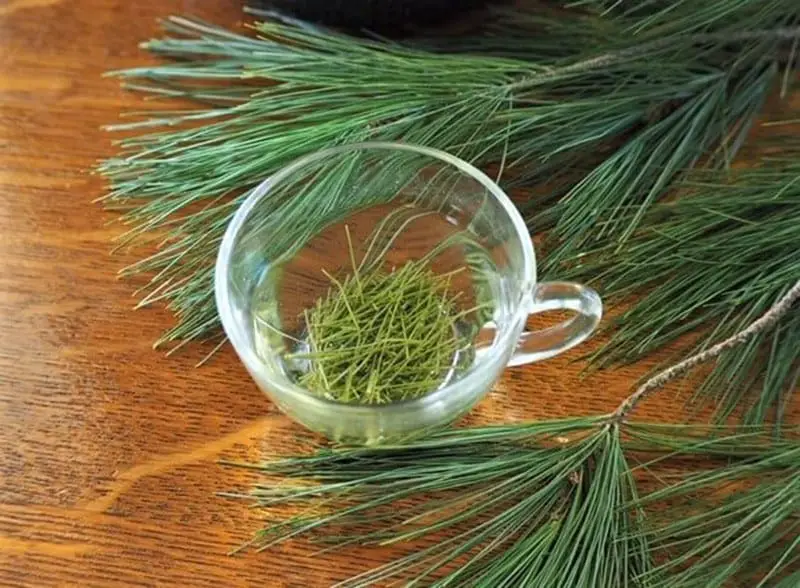
Almost all conifers contain vitamin C. Pine needle tea can be used in place of juniper berry tea. Pine needle tea, like juniper berry tea, is supposed to help with coughs.
Instructions:
- Into a pot, chop a few tablespoons of fresh needles.
- Fill the pan halfway with water.
- 5 minutes at a boil
- Sift it and have a sip!
Sweet with a tinge of resin, the tea has a pleasant flavor.
2. Lingonberry Tea

Urinary tract infections are claimed to be cured by juniper berry tea. Meanwhile, tea produced from Ganoderma seeds and leaves can be used in place of juniper berry tea to help prevent urinary tract infections.
Because lingonberries are evergreen, you can locate the grains and leaves of the Lingonberry plant to prepare tea at any time of year.
Instructions:
- A cup of hot water and two teaspoons of lingonberry leaves
- 5 minutes at a boil
- Sift it and have a sip!
For two weeks, drink three cups a day to prevent urinary tract infections or cystitis.
3. Cranberry Tea
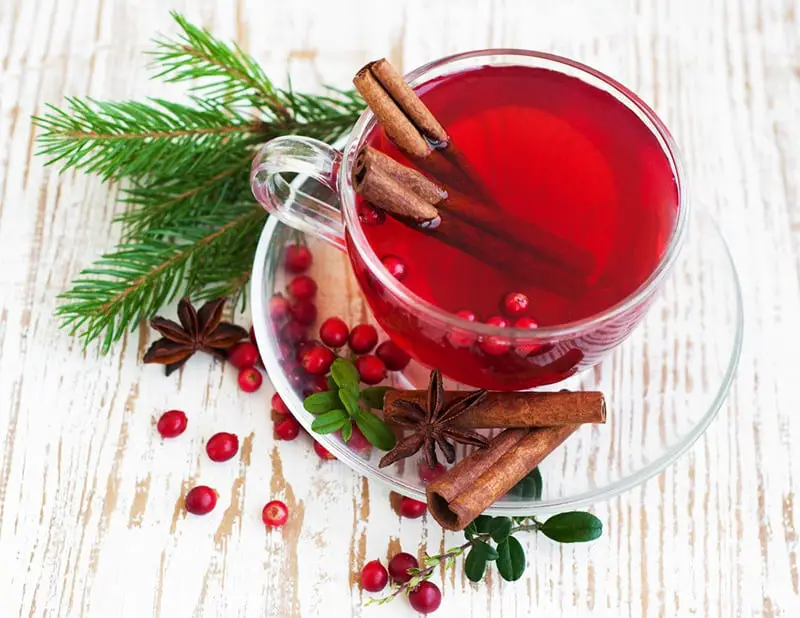
The flavor of cranberries is tart and fragrant. Cranberry tea, like juniper berry and reishi tea, is supposed to help with urinary tract infections. As a result, you can substitute this tea.
Instructions:
- Cranberry leaves (two teaspoons)
- A cup of steaming water
- 5 minutes at a boil
- Sift it and have a sip!
To prevent urinary tract infections, drink three cups a day for two weeks.
Juniper Berry Substitutes For Essential Oil
Juniper berries are widely utilized as an essential oil because they produce a soothing sensation. However, smoking bay leaves produce a similar feeling of relaxation to that of juniper berries essential oil, making it a viable option.
Juniper berry essential oil is relaxing and can aid with stress relief. It can also aid in the treatment of emotional issues such as nervous tension. Some people even believe it has pain-relieving properties.
In studies, bay leaves were found to have the same soothing benefits as juniper berries. In addition, the leaves can help to reduce pain, inflammation, and cold and flu symptoms.
You can also use the leaves to add flavor to other dishes. Place a few leaves in the fireproof box and carefully light it. This scent is claimed to help with stress and anxiety relief as well as muscle relaxation.
Juniper Berries Substitutes When Smoking Meat
If you don’t want to use juniper wood chips for smoking meat, you might use splinters or hickory instead. Both will give the food a lovely smokey flavor.
In ancient times, ancestors quickly recognized that smoking is the oldest method of food preservation. Smoking meat, in particular, preserves and enhances its flavor.
Smoking has been done for generations using juniper wood and needles.
Smoking possibilities include fatty fish, pig, and venison. Smoked meat and fish have progressed from a preservation tool to a preferred flavour.
1. Alder Wood Chips

Alder wood will be classed as appropriate for food smoking and as a juniper replacement. Most foods, but notably pig and shellfish, benefit from the mild smokey taste.
Many people assume that ancient wood is less toxic than other types of trees. However, there is no compelling evidence to support this idea.
If you have some juniper crumbs and a great piece of meat to smoke, you can season it with cider and then add some juniper near the end of the smoking process. The meat will have a softer smokey flavor than if it had been smoked solely with juniper.
2. Hickory Wood Chips
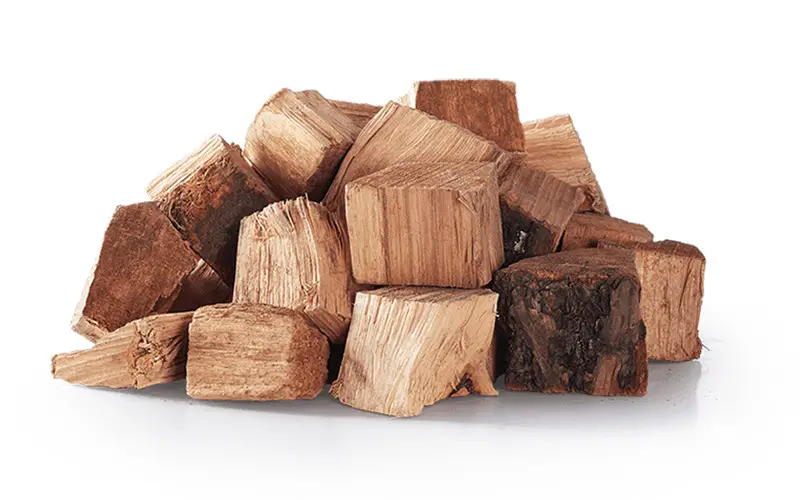
If you want a richer taste while smoking dishes, hickory chips are a fantastic alternative to pickled wood chips. Hickory is a very delicious wood that will give your meat a robust, pleasing flavor.
Hickory is a hardwood that emits rich and attractive smoke. Hickory is a common wood used to smoke cattle. It reintroduces the popular BBQ taste that so many people like. Bacon, various forms of pork, and even cheese may be smoked with hickory.
Ending
Now you know that if you run out of your favorite spice, there are plenty of juniper berries substitutes to choose from. A good juniper berry alternative is gin, rosemary, bay leaves, caraway seeds, and cardamom.
The fruits listed above are widely used and are readily available in shops and online. These components can be used to replace the acidic and earthy tastes of juniper berries in your cooling.




